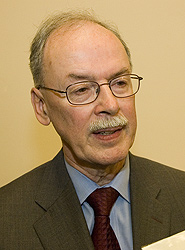Berkeleyan
A done deal: EBI contract is signed
Stanford's Somerville joins Berkeley faculty and will direct the institute; evaluation of research pre-proposals is already under way
![]()
| 28 November 2007
The strategic partners in the Energy Biosciences Institute - BP, UC Berkeley, Lawrence Berkeley National Laboratory, and the University of Illinois at Urbana-Champaign - announced on Nov. 14 that the contract finalizing the formation of the EBI has been signed and the institute's work is officially under way.
| An EBI FAQ Some key questions and answers about the Energy Biosciences Institute |
The institute will perform groundbreaking research aimed at the production of new and cleaner energy, initially focusing on advanced biofuels for road transport. The institute will also pursue bioscience-based research in three other key areas: the conversion of heavy hydrocarbons to clean fuels, improved recovery from existing oil and gas reservoirs, and carbon sequestration.
Christopher Somerville will become director of the institute. Somerville, an authority on the conversion of plant cellulose to energy, will join the Berkeley faculty as a professor of plant and microbial biology. A visiting scientist at LBNL, he has been director of the Carnegie Institution Department of Plant Biology and a professor in the Department of Biological Sciences at Stanford since 1994.
As part of its continuing drive to find longer-term commercial alternatives to oil and gas, BP announced in 2006 that it would invest $500 million over the next 10 years to establish the institute, the first public-private institution of this scale in the world. The EBI's emphasis on new fuels meshes with Berkeley's and Berkeley Lab's research aims to develop sustainable sources of energy and the University of Illinois' efforts to develop biofuel feedstocks. The three academic institutions formed a strategic partnership to submit to BP a proposal that was selected in February 2007 from among five international proposals.
Berkeley and its partners were selected in large part because of the quality of their energy-related research and their excellent track records managing large and complex research projects that deliver scientific and technological breakthroughs that can be deployed in the real world.
"We are very pleased that the institute's journey to develop new, cleaner sources of energy has begun. Our mission is to harness the potential of bioenergy, to make discoveries and to help them become commercially viable so they can benefit the world," says Somerville. "The institute will also examine the social, economic, and environmental implications of using cellulosic biofuels to meet a significant proportion of the earth's energy needs."
 Christopher Somerville, EBI director (Steve McConnell photo) |
Over the summer, the institute announced a call for pre-proposals and received more than 250 responses from Berkeley, Berkeley Lab, and University of Illinois researchers. This call was done in an open format, allowing submitters the opportunity to tell the institute what they deemed important or interesting. There was an even rate of participation in the process by the three partners and well-balanced coverage of the major topics of interest to the institute.
Pre-proposals were evaluated on their relevance to the following areas of emphasis: (1) biofuel feedstocks, including feedstock production, feedstock genetics, biomass composition, biotic stress, environmental impact and sustainability, harvesting, transport, and storage; (2) socioeconomic issues associated with biofuels or sequestration, including global socioeconomic impacts, next-generation assessment, biofuels evaluation and adoption, biofuels markets and networks, social interactions, and risks; (3) depolymerization of biomass, including pre-treatment technologies, enzyme discovery and evolution, integrated bioprocessing and industrial adaptation, and development of novel catalysts; (4) biofuel production, including systems biology, pathway engineering, and biofuel production systems; (5) fossil-fuel bioprocessing; and (6) microbially enhanced oil recovery.
Authors of about 85 pre-proposals were invited to submit a full proposal, and those are currently being evaluated. Awards are expected to be announced this fall, and another round of proposals will be solicited in spring 2008.

